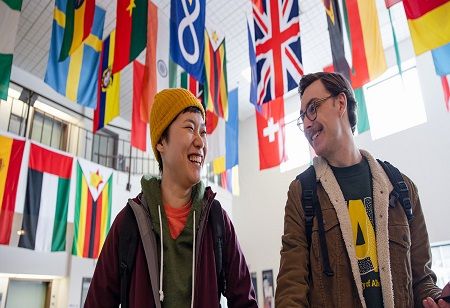- Chinese student Ma Tianyu among many rethinking U.S. education plans, as political tensions and visa uncertainties under Trump-era policies cause concern among international applicants.
- Experts warn U.S. risks losing global academic dominance, as countries like Canada and the UK seize opportunities to attract foreign students amid America's unstable immigration environment.
- Despite challenges, America’s job market and post-study work options like OPT keep it a top destination, though international students and educators are calling for more protection and clarity.
Ma Tianyu, a computer science major about to graduate in China, has his heart set on studying for a graduate degree in the United States. Attracted by the nation's world-famous programs in his area of interest game development Ma applied only to American universities and gained admission at several. However, after the initial euphoria had passed, a series of political events made him hesitate.
The U.S., China trade war started by President Donald Trump, and the subsequent warning from China's Ministry of Education regarding studying in the U.S., sent red flags. Things worsened when Ma saw a spate of terminations of legal status for international students in the U.S., which led him to consider how politics could influence his future. As apprehensions grow within his community, Ma holds true to his educational aspirations in America and affirms that he is ready "to adapt to whatever changes may come".
The United States has traditionally been a draw for foreign students in search of leading-edge research and a stepping stone to career opportunities in the U.S. job market. That image has been challenged, however, under the Trump administration, which implemented policies that made many foreign students feel unwelcome and exposed. They include increased visa scrutiny and attempts to deport international students who are pro-Palestinian activists.
As reported by Clay Harmon, executive director at the American International Recruitment Council (AIRC), the actions under Trump have clearly indicated that international students are not a priority. The change in attitude has prompted other competing nations to take the opportunity and promote themselves as better options. Canada has experienced an increase in student enrollments during Trump's first term and is expecting another rise. Universities Canada President Gabriel Miller called the period a true moment to pull in international talent.
Uncertainty arrives just as the U.S. was poised to recover from a pandemic-led drop-off in international students enrolling here. While its competitors, Canada, the United Kingdom, and Australia, tightened immigration rules lately, the U.S. was seemingly set to profit. However, American higher education observers think America could waste this advantage. Mike Henniger, CEO of Illume Student Advisory Services, noted that the U.S. previously was the clear number one foreign student destination country, but that advantage has been rapidly eroded.
Despite the challenges, America is still a draw for students interested in long-term career prospects, partly because of initiatives such as Optional Practical Training (OPT), which permits graduates to remain and work in the U.S. for a maximum of three years. Lindsey Lopez of ApplyBoard noted that America's huge and economically diverse labor market remains a strong attraction, with prospects across a broad range of sectors.
At New Jersey's William Paterson University, international enrollment is projected to increase. The institution, with approximately 250 international students out of 10,000, has strategically been building programs in STEM disciplines so as to capitalize on access to OPT as well as address student demand. Whereas some students have complained about securing visas, many, especially those from India, say they are still able to book appointments.
In the meantime, students in a Shanghai 12th-grade class instructed by Austin Ward, who presents an American Common Core curriculum, continue to get ready for U.S. college admissions. Even though Ward refrains from speaking about politics, he does say that students have mentioned they have concerns regarding the cancellation of international student visas. To date, none of his students have canceled plans to go to U.S. schools.
Frustrated by the uncertainty and its impact on his students, Ward has penned letters to his U.S. congressman, stressing the need to protect international students who, in his words, are coming to America to "expand their horizons", not to be any danger. He cautioned that if students are allowed to lose their legal status and feel not welcome, the U.S. risks losing its position as a world academic leader.

